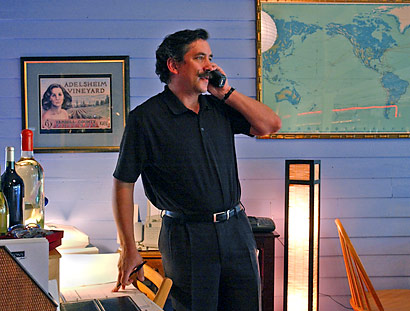
When Hüsker Dü officially ended in January 1988, bassist Greg Norton was 29, decidedly unwealthy and unemployed. He ended up in the restaurant business, first as a server, then as a chef. “I had some natural ability and a good palate, so I dove into that,” says Norton. “My only training was just on the job.” By 1995, Norton had attained the position of head chef at Staghead in Red Wing, Minn., where he met his second wife, Sarah, in the kitchen. In 2003, the couple opened their own place, The Nortons’, in Bay City, Wisc., about 60 miles from Minneapolis. The Nortons’ serves contemporary American cuisine and boasts an award-winning wine list. Says Norton, “It’s not a novelty act: ‘Ex-punk rocker becomes chef.’ We actually know what we’re doing.”
After leaving the Replacements in 1990, drummer Chris Mars continued making music: From ’92 to ’96, the “quiet” member of the Mats released four solo records. What might’ve begun with creating his album covers has blossomed into a full-blown visual-art career for Mars, who now paints full-time. “Some call my art surrealist, because I like to work with lots of detail,” says Mars, who still lives in Minneapolis. “But I think of the work as closer to expressionist, except perhaps that I’m not investigating the self as much as the world outside of me.” According to Mars, the imagery in his paintings is also informed by his older brother Bill’s battle with schizophrenia. His artwork is on permanent display at the Minneapolis Institute of Art and has been purchased by celebrities such as Prince, Tom Petty and Michael Stipe, not that Mars cares very much. “My mom and my wife own some of my work,” he says. “That makes me most proud.” Mars declined to speak about the Replacements, saying, “I’m just not living in that space anymore. It’s been so long, I feel more and more removed as time goes by, and I’m on another path.”
Chris Osgood—pioneering punker, guitar teacher and benevolent godfather of the Minneapolis scene—has continued to be a paternal figure around town since the Suicide Commandos called it quits in 1978. “We were the only band I knew that broke up with assets—stuff to sell, a PA,” says Osgood. “We cashed out for a few hundred bucks each.” As director of artist services at Springboard for the Arts, Osgood counsels artists, musicians, writers and actors on how to manage their assets and market their work.






